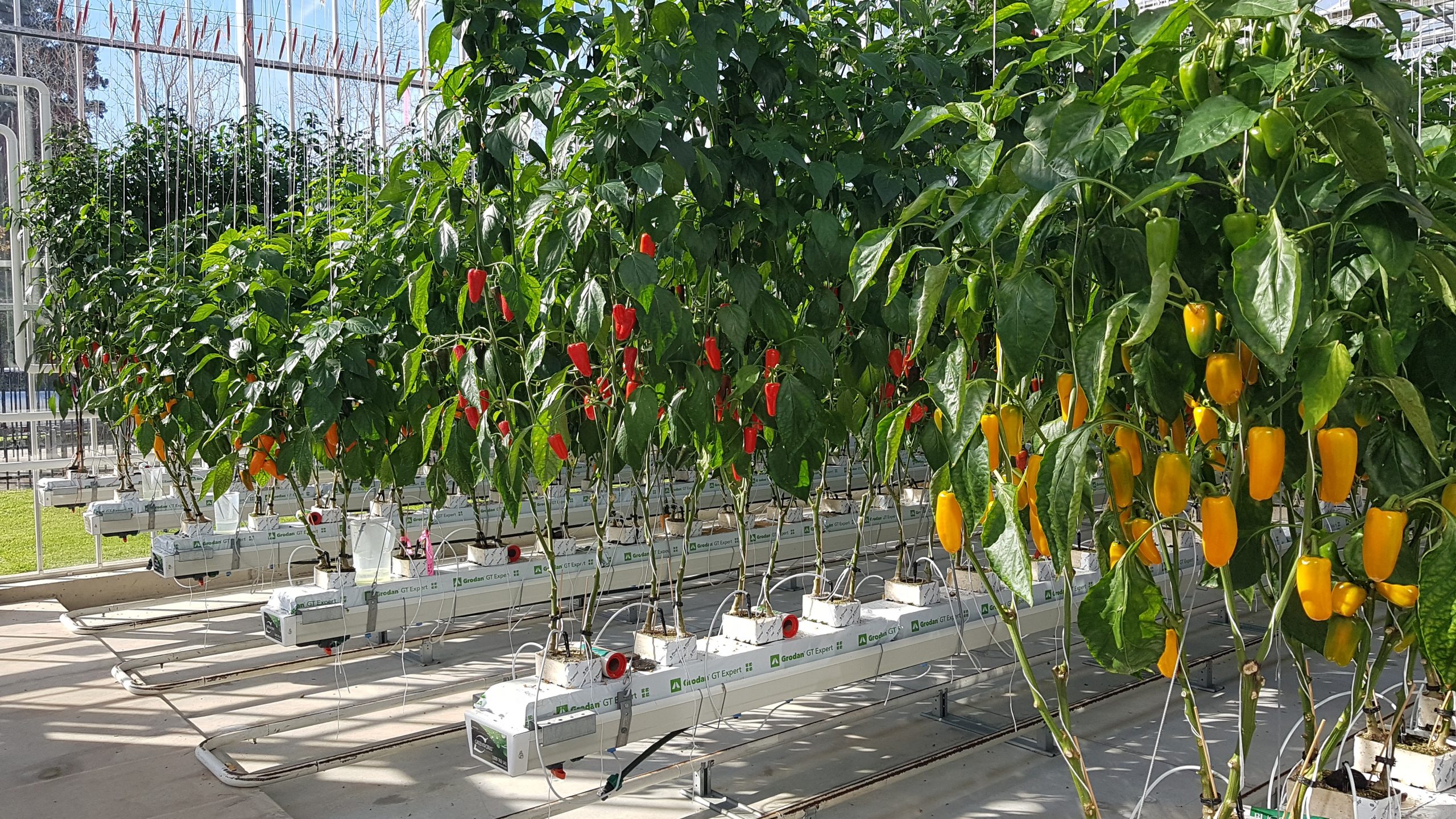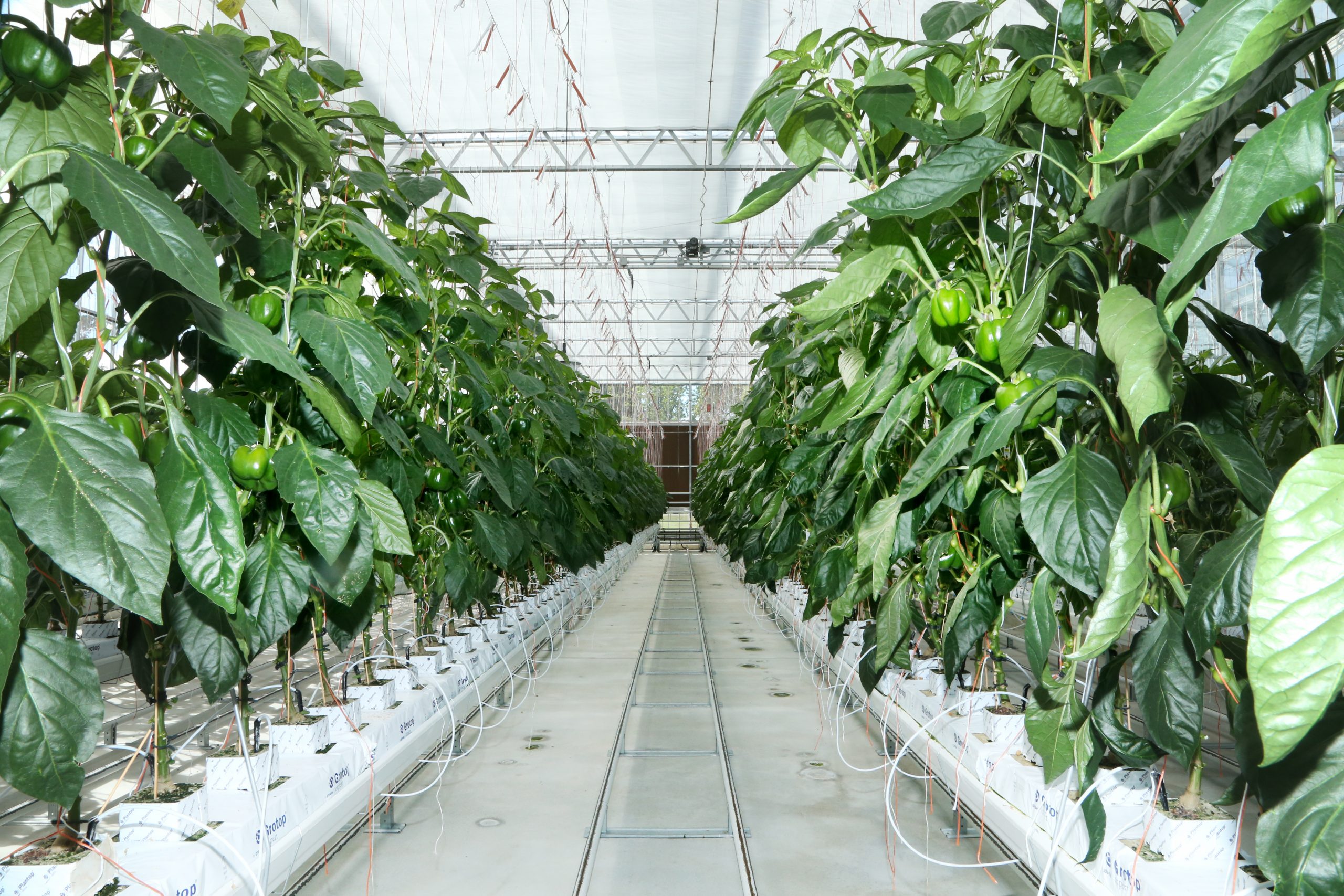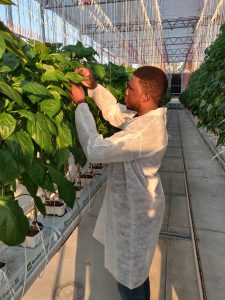
Fostering leadership in the protected cropping industry
14 September 2021
Tomato potato-psyllid in Australia: Yesterday, today and tomorrow
14 September 2021The protected cropping industry is one of the fastest growing agricultural sectors in Australia. In recognition of this, Western Sydney University, Hort Innovation and five industry partners are delivering the Graduate Diploma in Protected Cropping. In this edition, Diploma graduate Elliott Akintola speaks to Michelle De’Lisle about the course, what he learnt and how it applies to his nation-wide agronomy role at Garden City Plastics.
Can you please tell me about Garden City Plastics? What is your role in the business, and what does it involve?
Garden City Plastics (GCP) is owned and operated by an Australian family. With warehouses in all states and a manufacturing facility based in Melbourne, GCP is the largest plastic plant pot manufacturer for the horticulture and ornamental industry in Australia. Since 1975, the business has evolved to include the supply of horticultural products such as substrates/media, plant health and nutrition products, hardware and accessories to growers all across Australia.
I work in the company as an agronomist who provides tailored technical agronomic support to growers and customers. This can be for pest and disease, nutrition, weed management, Integrated Pest Management (IPM) and more. I am also responsible for overseeing the chemical range of the business, ensuring that the right plant health and protection products for our growers in the industry are carried within our range.
You recently completed your Graduate Diploma in Protected Cropping. Why did you decide to study this course? Had you completed anything like this in the past?
I completed my Bachelor’s degree in agricultural technology about a decade ago. Since then, I have worked across agricultural industries spanning two continents. My family background and roots are deeply connected to the principles and practice of agriculture. This gave me an awareness of the impact of agriculture on livelihood, the environment, and the economy. I know first-hand the issues surrounding food security and the collective effort needed to ensure sustainability.
Besides, it is estimated that world population will reach about 10 billion people by 2050 and it has been established that intense competition for resources such as land, water and energy would continue. Protected cropping provides an innovative and sustainable approach to meeting these needs and solving these challenges.
In Australia, protected cropping is the third fastest growing sector in agriculture and we must develop local talent and research to suit the climatic requirements and available resources. These issues and many more propelled me to specialise and build my professional understanding in the protected cropping field.
How did you hear about the course?
I heard about the course in October 2018 while at a Protected Cropping Australia grower tour at Western Sydney. During the tour, Professor Zhonghua Chen presented a tertiary study pathway, which included the Masterclass in Protected Cropping.
Attendees also had the privilege to tour the newly built state of the art National Vegetable Protected Cropping Centre, which is a high-tech glasshouse facility located at the Western Sydney University’s Hawkesbury Campus. I was excited to see the level of investment the government, industry and the university had made into the facility and saw the advantaged practical implications of studying the course.
Personally, what were the course highlights?
It was a wide-ranging course that was rich in content, and there were many highlights. First was the research component – aside from the ability to utilise the latest technological tools and equipment for research, the course afforded the opportunity to investigate issues that are relevant and applicable in the industry.
The industry project component of the course was designed to enable students to partner with growers or stakeholders within the industry to explore a research topic. The unit alone helped to sharpen academic writing skills, project management skills, networking, and communication skills, to mention a few.
Distinguished academics delivered course units as well as growers who had both high- and low-tech production systems. They reflected on their practical experiences and the daily challenges. This ensured that there was a link between theory and practice, and visits to growers and research sites were included.
What did you take away from the course that you can apply to your role at Garden City Plastics? Is there anything that you can teach others in the workplace?
There are numerous lessons that I have taken away from the course that I apply daily, especially with providing agronomic support to GCP customers (growers) in the industry.
Through the course, I was able to have access to additional tools to apply in my role. These include pest and disease management, nutrition advice or developing recipes, evaluating biosecurity risks, or finding innovative approaches to improved business outcomes. This acquired training is also passed on to the field sales managers across the country as they interface with growers daily.
However, since GCP does not grow any plants, the course has helped me to clearly understand the intricate cause-and-effect of practices in the industry that would be detrimental to its growth. For instance, I had the privilege of evaluating the sustainability of the protected cropping industry in relation to the United Nations Sustainable Development Goals. Since GCP is the largest manufacturer of plastics to the industry, I am contributing towards the close looped recycling program and sustainability of plastics in the industry. Today, the pp5 recycling program is underway, especially in the ornamental industry.
How did you juggle full-time work with your studies? What tips would you have for other industry members who are thinking of studying while working?
Just like with any new project or idea or ambition, the first step is usually the hardest. But, with eyes on the goal, every subsequent step will be worth it. The excitement and acquisition of knowledge will spur any student to continue to commit to the study process.
In addition, having a good support system is critical. I work full- time and have a young family. Therefore, creating a balance and relying on my support systems helped me get through the course. My family was understanding and made sacrifices to allow me to put in extra hours after work and on weekends to focus on my studies. My employer, GCP – particularly my supervisor Mathew Mills – encouraged me to pursue my passion for agriculture and learning. They made it possible for me to take leave from work to attend workshops and practicals at school, and conduct research with customers in the industry. Finally, the composite course delivery mode and the experienced and understanding tutors helped to ensure effective and successful learning.
Will you undertake any further education in the protected cropping space?
I am extremely excited about the protected cropping space and I will continue to learn, grow, innovate, and explore all that it has to offer in the Australian industry. I am currently enrolled in a Master of Science specialising in greenhouse horticulture. I aim to actively contribute to industry growth and continue to research the protected cropping space.
What’s next for your career in the horticulture industry? Where do you see yourself in say, 5-10 years’ time?
I plan to continue to consult and carry out research within the industry. In the next 5-10 years, I hope to investigate and find new innovative approaches to sustainable practices within the industry. I am currently researching topics around sustainability with an emphasis of inputs such as media in the Australian protected cropping industry. I may also have achieved a PhD, and made several discoveries that will propel the Australian industry to pole position in the world.
Would you recommend this course for horticulture industry members? Why/why not?
Yes, I would recommend this course to industry members and encourage businesses and stakeholders to support and sponsor their staff and other passionate young individuals to achieve this educational training and qualification.
The National Vegetable Protected Cropping Centre is a reputable facility that guarantees effective high-standard learning. With more skilled local talents, the industry can develop solutions that are built and modelled in Australia.
I was privileged to be awarded the COSTA Group Protected Cropping Scholarship for my graduate diploma program and this financial support was immensely helpful to achieve this qualification. I strongly encourage industry members to support the next generation to undertake this study and close the gap in skilled labour shortages.
I would also like to use this opportunity to thank all those that played a role in enabling me to achieve this qualification.
Acknowledgements
Emerging leaders in protected cropping is funded by the Hort Frontiers Leadership Fund, part of the Hort Frontiers strategic partnership initiative developed by Hort Innovation, with co-investment from Western Sydney University, Flavorite, Costa Group Holdings, Perfection Fresh, Australian Fresh Leaf Herbs, ICI Industries and contributions from the Australian Government.
Project Number: LP18000



